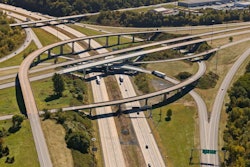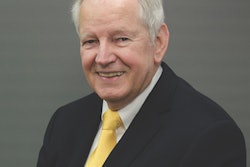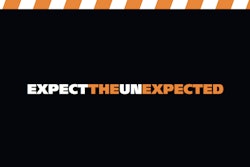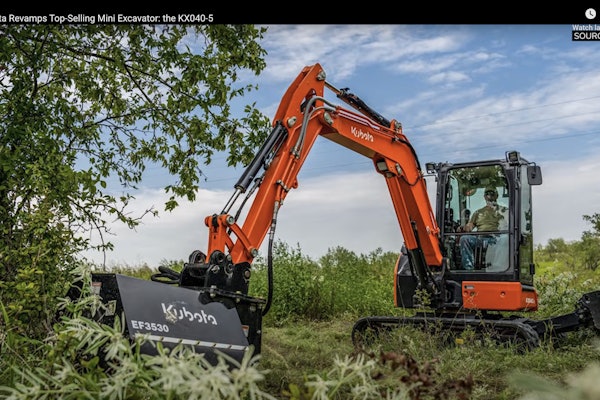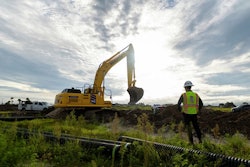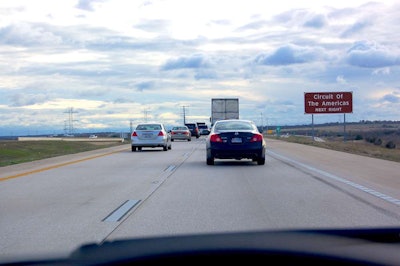 Tapping the brakes on the fastest road in Texas.
Tapping the brakes on the fastest road in Texas.When push comes to shove, Texans can get more than a little rowdy. Of late, their cantankerous streak has flared up in opposition to the state’s toll road programs.
For those of you who are not familiar, the newest toll roads in Texas use license plate scanners and other technology to eliminate toll booths and attendants. This speeds things up on the road, but bogs down in the details of billing and payment.
A watchdog reporter took quite a bite out of the North Texas Tollway Authority recently with this piece in the Dallas Morning News. According to the article the NTTA’s billing practices are “horrendous.” In February the NTTA sent out a press release hinting at the magnitude of the problems. Some excerpts:
“Pay-by-mail ZipCash drivers didn’t get invoices, warning letters or collection notices in the mail.”
“Customers should be advised of a possibility of heavy call volumes and should consult the NTTA.org for predicted wait times.”
“No one at NTTA noticed that 192,000 erroneous transactions from newly opened toll lanes along State Highway 114 should not have been charged.”
Be sure to check the comments in the article link above. I love the one from the man whose home was boxed in on all four sides by toll roads and now he and his family have to pay hundreds of dollars a month to get in and out of his neighborhood.
Reporter Dave Lieber’s article stemmed from a letter written by Dallas resident Natalie Richards who got caught up in the NTTA’s Kafka-esque bureaucracy. Richards tried to inquire about a bill for $5.73 only to be told she actually owed $1,125. And $431 of that was for fees.
The NTTA claimed it mailed her 10 letters, but it used the wrong address. She got the bill reduced to $641, but was threatened with arrest. For Richards, the issue is still not resolved.
Welcome to the brave new world of toll roads, where an army of bureaucrats lost in a wilderness of technology tie up the public’s time and money with industrial-strength red tape.
Transportation researcher Bob Poole, who writes the newsletter Surface Transportation Innovations for the Reason Foundation, has taken note of the toll road anger in Texas. Poole says that 10 years ago the state was poised on the cutting edge of toll road innovation, but as of March this year three legislators had filed bills aimed at phasing out toll roads altogether throughout Texas. Poole also makes this observation:
Ironically, what those people want to return to is socialized, politicized highways funded by taxes rather than user fees, preferably taxes paid by someone other than road users, such as oil and gas companies. They also want highway project selection to be done by politicians rather than by transportation professionals using benefit/cost analysis and value-for-money studies.
Poole’s newsletter is generally excellent on transportation infrastructure issues, free and well worth your time to subscribe. But I’m not quite sure what he means by “socialized.” We socialize our national defense. We socialize our welfare systems, law enforcement and tax collection. And our roads have been socialized ever since we first started paving them. There are some things every society must do collectively. After defense, roads are the second most important of them.
The next questionable phrase in Poole’s post is “politicians, rather than…transportation professionals.” Everybody gripes about politicians but at least you can pressure them, especially at the state and local level—which is what is happening in Texas. I’ve had much better luck getting politicians to return calls than I have unelected bureaucrats.
And if you tell me “transportation professionals” are going to determine the location, scope and funding mechanisms of my roadways, exactly who do I call to complain? The NTTA is full of transportation professionals.
What’s more, most roads are built using the advice and research of transportation professionals with the politicians being ultimately responsible for the results. It’s a shared obligation between the DOTs and the public via their elected representatives. That’s how all government agencies work. Staff professionals make recommendations, politicians ensure accountability and public viability, and things get done.
I agree with Poole that some politicians in Texas and elsewhere play a shell game when it comes to hiding the cost and the source of road-building funds. Poole rightly points out the absurdity of Texas governor Greg Abbott saying he was going to boost transportation funding by $4-billion “without raising taxes, fees, tolls or debt.”
Texas just passed a bill known as Prop 1 that will levy a 1 percent charge on oil and gas coming from the wells and use that money for roadbuilding. But if this isn’t a tax or fee what is it? A gesture of goodwill?
The public will pay regardless, not at the pump, but an additional 1 percent for all products that emerge from the state’s oil and gas wells. And that’s not just oil and gas. That’s nylon, rayon, and plastics like skateboard wheels, soda bottles, guitar picks and water-repellent fabrics. That means people outside of Texas, the consumers of any hydrocarbon-based products that originate in Texas, will help fund the Lone Star State’s roadbuilding.
So for all you people from Maine to California in your Patagonia jackets and moisture wicking polypropylene fitness gear, the citizens of Texas say “thank you.” But for Abbott to suggest it’s not a tax is disingenuous.
There are only two user-based ways to pay for our transportation infrastructure: the gas tax at the pump or a mileage-based system. The gas tax has been a proven and reliable method. It is low-tech, infinitely scalable and requires no complicated technology and almost no administrative costs. It has worked flawlessly since the 1950s, and only ran dry 20 years after President Bill Clinton failed to index it to the cost of inflation. Had he done that we wouldn’t have all these troubles.
Mileage based systems are more problematic. You either need in-car GPS or license tag readers like the ones used in Texas. Both are going to bring about a nightmare of mangled mailings, call waiting and electronic hiccups of the kind described above. They’re good for the vendors and bureaucrats, horrible for the public. Oregon is the first state to proclaim for a mileage-based system, named Ore-Go. Then again Oregon was one of the first states to legalize pot too. Draw what conclusions you will.
Eight states have raised their gas taxes in the last two years and 12 more are close to doing the same this year. That’s almost half the country. The states are forging ahead while the feds knot up their knickers.
Texas has yet to consider raising it’s gas tax. But toll road advocates ought to take note of what happened there. Former governor Rick Perry thought he could make all his banker friends rich by underwriting bonds for a vast network of toll roads. But it didn’t work. Voters rejected his plans, in part because Texas still has some hard hitting print journalism–a handful of good daily newspapers and Texas Monthly, which at times serves as a statewide, monthly newspaper. The state has an impressive array of public advocacy groups as well. Texans are not only rebellious, they’re politically engaged and well informed.
So if you’re trying to pull the wool over the public’s eyes, I wouldn’t recommend the Lone Star State. Oregon, however, should be ripe for picking.




